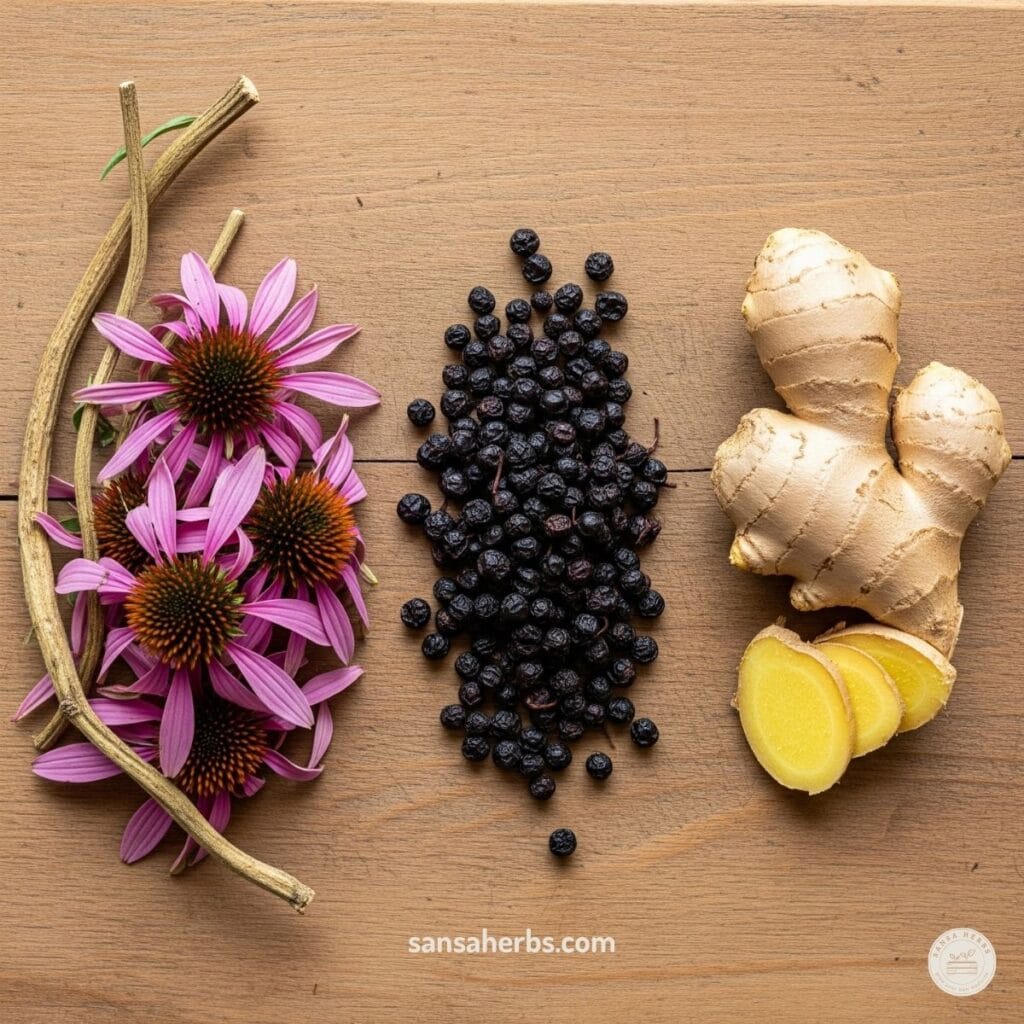Using the right herbs for cold and flu can help you strengthen your immunity before flu season peaks by supporting your body’s natural defense systems. To achieve a “quick boost,” focus on immunomodulators like Elderberry and Echinacea, which prepare your cellular response before a viral load occurs.

Using Medicinal Herbs for Health: The 2026 Immunity Toolkit
Before we dive into the recipes, ensure your “backyard pharmacy” is stocked with the right tools to extract these nutrients. Using medicinal herbs from your own garden ensures you have the freshest ingredients when the first sneeze hits.
- The Seeds: Medicinal Garden Kit (Includes Echinacea and Yarrow, the two most important herbs for cold and flu to grow at home).
- The Berries: Organic Dried Elderberries (Bulk dried berries are the most cost-effective way to make a year’s supply of syrup).
- The Extractors: Mortar and Pestle for bruising fresh ginger; Herb Affair Capsule Machine for DIY powders.
- The Potency Booster: Moringa Magic Capsules (Natural herbs for health that provide a daily vitamin boost).
Elderberry: The Most Searched Natural Herb for Cold and Flu
Elderberry is the “viral inhibitor” of the herbal world. When people look for herbs for cold and flu, elderberry is usually at the top of the list because it contains anthocyanins that prevent viruses from attaching to your cells.
Does elderberry actually boost the immune system?
Yes. Research suggests that the anthocyanins in elderberry significantly increase cytokine production, the chemical messengers that tell your immune system to wake up and fight.
Pro-Tip: If you are looking for the best elderberry gummies for 2026, look for brands that include Zinc and Vitamin C for a “triple-threat” effect. However, for the most potent results, I recommend making your own syrup. I use dried berries from Amazon and combine them with fresh Echinacea harvested from my Medicinal Garden Kit for a dual-action tonic.
The Tropical Edge: Strengthening Immunity in the Caribbean
As an herbalist based in Trinidad, I have access to “Living Gold” that you won’t find in most store-bought supplements. When looking for a “quick boost,” don’t overlook these tropical powerhouses:
1. Moringa for Metabolic Resilience
Moringa provides a nutritional lift that prevents the energy “crashes” that often leave your immune system vulnerable. While I use a specific “No-Boil” method to keep the nutrients alive (see my Full Guide to Moringa Prep), simply adding a teaspoon of powder to your morning routine can make a massive difference.
2. Fresh Ginger for Circulation
Fresh ginger is one of the most accessible herbs for cold and flu. It acts as a circulatory stimulant, helping your body transport white blood cells to the “front lines” of an infection more efficiently.
3. Shining Bush (Pansit-pansitan):
Traditionally used in Trinidad to cool systemic inflammation, which is vital when your body is fighting a fever. Read more about the benefits of shining bush here.
For easy immune and joint support on the go, these tasty ginger and turmeric gummies are our top pick!
DIY Quick-Boost Recipe: The Sansa Resilience Tonic

This recipe uses the elderberries and fresh ginger I keep in my Trinidadian kitchen for a fast-acting immune shield.
- Crush: Use your Mortar and Pestle to bruise 1 tablespoon of fresh ginger and 1 tablespoon of dried elderberries.
- Infuse: Pour 185°F (not boiling) water over the herbs and steep for 10 minutes.
- Enhance: Add a squeeze of lime and local honey.
- Drink: Consume every morning for 7 days before the peak of flu season.
DIY Immune-Boosting Recipes for Beginners
Ready to start using these herbs at home? We have dedicated guides for making your own remedies:
- For a long-term supply: see my full Elderberry Syrup for Beginners guide.
- Make Your Own Tinctures and Immune Teas: Get the full simple tea recipes and a guide to making your own tinctures in our complete resource: Growing Echinacea from Seed: The Complete Guide to a Healthy Medicinal Garden
- Learn how to create the ultimate throat-coating remedy with a cold infusion in our guide: Marshmallow Root for Sore Throat.
Expert Insight: The Medicinal Garden Kit
For those who want to take their herbal journey to the next level, growing your own medicine is incredibly rewarding.
A great starting point is The Medicinal Garden Kit, which includes seeds for ten medicinal herbs, including herbs for cold and flu, such as Echinacea.
The kit also provides guides and resources to help you confidently cultivate your own herbal apothecary, putting the power of plant medicine directly into your hands.
A Quick Guide to Safely Using Herbs
While herbs are natural, they are powerful. It is always important to use them safely.
- Consult a Professional: If you have an underlying health condition, are pregnant, or are taking medications, consult with a doctor or certified herbalist before starting a new herbal regimen.
- Important: Never consume raw elderberries as they contain compounds that can cause digestive upset; they must always be cooked into syrup or dried before use.
- Start with a Low Dose: It’s always best to start with a small amount to see how your body reacts.
- Listen to Your Body: If you experience any adverse effects, stop using the herb and consult a healthcare professional.
FAQ: Strengthening Your Immunity in 2026
What are the best herbs for cold and flu?
What is the best elderberry dosage during flu season?
Can I take Moringa and Elderberry together?
Where can I find supplies for making home remedies?
A Note on Credibility
While the information in this article is designed to be helpful and accessible, it’s essential to consult with qualified professionals for your specific health needs.
We’ve sourced our information from a variety of reputable sources, including traditional herbal wisdom and modern research.
For additional reading about herbs for cold and flu, consider exploring the resources provided by the American Herbalists Guild, a professional organization that advocates for the responsible practice of herbalism.